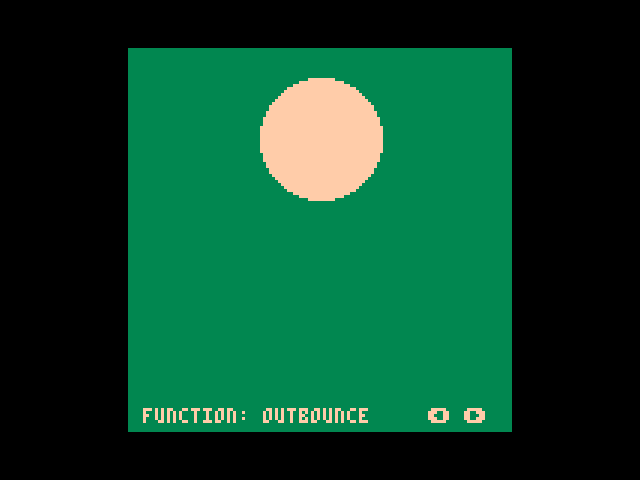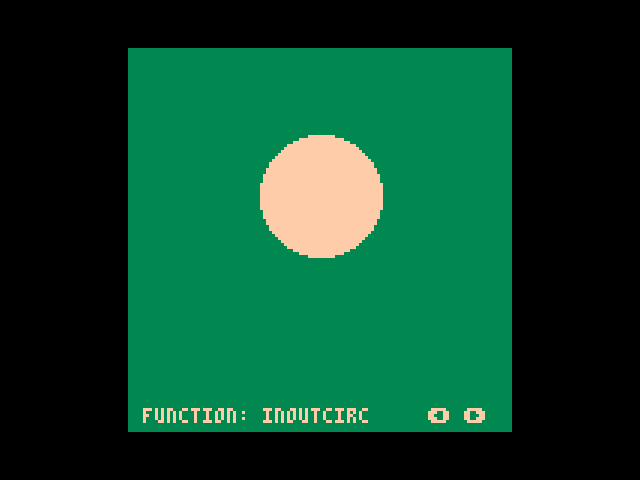PICO-TweenMachine is a small wrapper utility for the PICO-8 fantasy console, meant as an extension for another library of mine - PICO-Tween.
The original library simply provided a collection of tweening/easing functions, and their math dependencies for use in your code. This extension exists as a lightweight wrapper to drive all tween related code in clean and clear manner, reducing the boilerplate and mess nestled within your codebase.
This library currently sits at 277 tokens, not including any actual tweening/easing functions.
Whilst the intent for this library is as an extension to my own port of tweening functions for the PICO-8, it is completely dependency free, and will be completely compatible with any of your own tweening functions provided that they take arguments in the same way as traditional Robert Penner styled tweens.
All notable changes to this project will be documented in this file.
The format is based on Keep a Changelog and this project adheres to Semantic Versioning.
An additional pair of utility functions, utilities:assign and utilities:deep_assign, which provide functionality for both shallow and deep copying fields in bulk from one (or more) source tables to a specified target table. These are the same functions as currently used in PICO_EC, so if you also happen to be using that repo, you should remove one set of the functions to avoid conflicts.
Adjusted the way tween instances are constructed in the factory function tween_machine:add_tween. The base __tween class no longer has it's properties declared in the global scope, and are instead constructed in an anonymous table within the add function. The reason for this, is the current method allows for non-declared fields within the instance parameter to write directly to the backing table, rather than a version of the field local to the created tween instance. This causes conflicts between tween instances when more than one are improperly declared. The new construction method should remove this issue without causing users to have to declare more fields than they want to overwrite from the default values, wasting tokens.
Like any PICO-8 library, integrating this library into your cart is as simple as copy/pasting the source into the top of your code (I recommend the top in order to avoid problems with object ordering).
If you plan on using your own tweening code, then simply follow the examples provided for setting up tweens in the Basic Usage section.
If you'd like to use the library as intended, then grab the easing functions from the PICO-Tween repository and follow the setup advice there for functions to grab for your usage.
After copying over the sources to your cart, using a tween with the library is very simple. You simply need to call the tween_machine:add_tween function, passing the fields you'd like to set as an object. The add tween function also returns an instance of the tween, which should be stored somewhere in order to remove it from the wrapper at any point, or for polling the current value of the tween. Any code that you want to call during each step of the tween or after the tween has finished running can be registered as callbacks with the __tween:register_step_callbacks and __tween:register_finished_callbacks functions.
Following this, all you need to do is add: tween_machine:update() to your _update() function.
Here's a small example showing how this can be used in action (assuming the wrapper has been pasted to the top of the cart):
function linear(t, b, c, d)
return c * t / d + b
end
local move_distance = 30
local move_duration = 1
local easeprop = 0
function set_ball_position(position)
easeprop = position
end
function reverse_ball_direction(tween)
tween.v_start = tween.v_end
tween.v_end = -tween.v_end
tween:restart()
end
function _init()
ball_tween = tween_machine:add_tween({
func = linear,
v_start = -move_distance,
v_end = move_distance,
duration = move_duration
})
ball_tween:register_step_callback(set_ball_position)
ball_tween:register_finished_callback(reverse_ball_direction)
end
function _update()
tween_machine:update()
end
function _draw()
rectfill(0, 0, 128, 128, 3)
circfill(64, 60 + easeprop, 20, 15)
endYou should get the following results:
You can find a test cart that allows you to cycle through all of the easing functions in the cart folder if you want to load it up into the console and play around with it!
Here are some example gifs:
The API documentation for the library can be viewed here.








